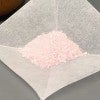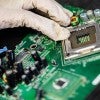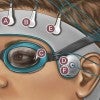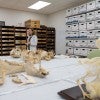
Best yet to come for stellar jet researchers
New findings about stellar jets also provide a path forward for astronomers awaiting launch of the James Webb Space Telescope.

Best yet to come for stellar jet researchers
New findings about stellar jets also provide a path forward for astronomers awaiting launch of the James Webb Space Telescope.

Consumers see diverse organizations as moral ones, study shows
When people see diversity in a corporate team, they’re more likely to believe the team behaves in a moral fashion, according to research conducted by Ajay Kalra, the Herbert S. Autrey Professor of Marketing at the Jones Graduate School of Business, and Uzma Khan, associate professor of marketing at the University of Miami Herbert Business School. Their work has just been published in a paper entitled "It's Good to Be Different: How Diversity Impacts Judgments of Moral Behavior."

Manganese makes its mark in drug synthesis
Rice University chemists find manganese far superior to silver and cerium as a way to make building blocks for drug design and manufacture.

Urban mining for metals flashes electronic trash into treasure
Flash Joule heating recovers valuable and toxic metals from electronic waste. The process allows for “urban mining” of resources that could be a win for the environment as well as for manufacturers.

Renewable energy will increase security and lower geopolitical risk, study shows
The transition to renewable energy will make the U.S. energy supply significantly more secure not only by decreasing the mining and materials required to build fossil fuel systems, but also by avoiding the political risks that threaten fossil fuel supply chains, according to new research from Rice University’s Baker Institute for Public Policy.

Corps of Engineers funds bid to ‘flash’ waste into useful materials
A $5.2 million U.S. Army Corps of Engineers grant will expand Rice efforts to recycle waste into valuable products through flash Joule heating.

US Army backs ‘sleeping cap’ to help brains take out the trash
Rice engineers are developing a noninvasive device to understand how the brain disposes of metabolic waste during sleep.

Sylvia Dee wins fellowship to launch Gulf of Mexico study
Sylvia Dee, an assistant professor of Earth, environmental and planetary sciences, wins an early-career fellowship to pursue Gulf of Mexico research.

Maryland health care payment model reduces costs and complications, study shows
Maryland health care payment model reduces costs and complications, study shows

American Chemical Society honors Gustavo Scuseria
Rice University’s Gustavo Scuseria wins the American Chemical Society Award in Theoretical Chemistry.

Old bones get new life in renovated Rice laboratory
The skeletons of more than 800 Southeast Texas animals are getting a second life in a renovated archaeology lab space at Rice University.

A loose-fitting mask may be doing you no favors if you’re around SARS-CoV-2.

Sex and the symbiont: Can algae hookups help corals survive?
Scientists have discovered that symbiotic single-celled algae that live inside of and feed corals can reproduce not only by mitosis, but also sexually. Encouraging sex in these algae can accelerate their evolution to produce strains better able to help reefs cope with climate change.

Rice lands grant to improve time-release drugs
HOUSTON – (Sept. 21, 2021) – Time-released drugs are about to get a geometry lesson, thanks to bioengineers at Rice University.

Grant backs effort to build useful bacterial colonies
Rice scientists have won a grant to advance the development of custom-designed microbial colonies for a variety of applications.